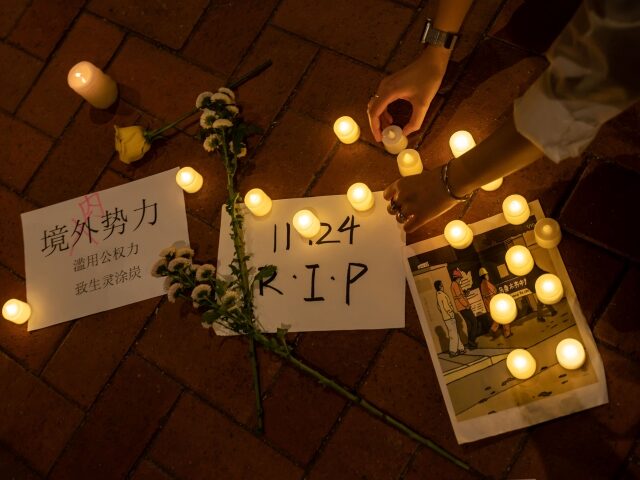Sympathy demonstrations were held in Taiwan and Hong Kong on Sunday and Monday to show support for China’s massive anti-lockdown protests, even as the Chinese Communist Party’s crackdown on demonstrations appeared to be suppressing the movement.
Supporters held a candlelight vigil in Taipei on Sunday, attended by many displaced Hong Kongers and former residents of China.
The Taipei vigil paid homage to the anti-lockdown protesters by repeating some of their slogans, plus hardy perennials like “Give me liberty or give me death,” and waving blank pieces of paper – a symbol of defiance made popular by the Hong Kong pro-democracy movement in 2019 and now embraced by the anti-lockdown protesters.
“Freedom is not a thing to be given but it will come after everyone fights for it,” said Chinese pro-democracy activist Zhou Fengsuo. Zhou was in Taipei to attend a forum on the recent Taiwanese elections, in which the more pro-Beijing of Taiwan’s major parties fared disturbingly well.
Several dozen courageous demonstrators gathered for a similar solidarity vigil in Hong Kong, where criticism of the Chinese Communist regime was made illegal under a ham-fisted “national security law” in 2020. It did not take long for Hong Kong’s Beijing-controlled police to shut the sympathy vigil down.
“Hong Kong police warned some protesters for violating a ban on groups of 12 or more people and cordoned off the area to record protesters’ identities. They were then allowed to leave,” the UK Guardian reported on Monday.
The Associated Press (AP) described the sympathy vigils at the Chinese University of Hong Kong and a few other city locations as “the biggest protests there in more than a year under rules imposed to crush a pro-democracy movement in the territory,” even though the university vigil only had about 50 attendees.
The Hong Kong demonstrators lit candles, repeated anti-lockdown protest chants, and waved white pieces of paper like those in Taipei, but were obliged to take the additional step of hiding their faces to avoid identification and retaliation by their local government. This would explain why some of them had to be detained for the police to “record” their identities, as the Guardian reported.
More sympathy protests were reported by Reuters on Monday in cities like London, Paris, Tokyo, and Sydney, many of them populated by “expatriate dissidents and students.”
“It’s what I should do. When I saw so many Chinese citizens and students take to the streets, my feeling is they have shouldered so much more than we have. We’re now showing support for them from abroad,” said Chiang Seeta, a graduate student who helped organize the Paris demonstration.
Another organizer, a Chinese student at Columbia University in New York who asked to be quoted under a pseudonym, told Reuters her event on Monday would “steer clear of sensitive issues such as Taiwan’s status and China’s mass internment of ethnic Uyghurs in Xinjiang” because she felt those topics would “alienate a lot of people.”
The AP reported that even as these sympathy vigils spread across the free world, the anti-lockdown protests in China have been largely halted by massive police deployments.
Chinese police aggressively seized and checked cell phones from random citizens in Shanghai, where some of the largest demonstrations were held, a tactic that would intimidate people out of searching for news about the anti-lockdown movement or attempting to organize further protests.
Radio Free Asia (RFA) reported on Tuesday that Chinese human rights lawyers are “scrambling to assist the friends and families” of those arrested during the anti-lockdown protests.
“So many people have been calling. Our phones were blowing up because people had lost contact with their friends, and we found that people had been taken away in many different places, including Shanghai, Beijing, Ningbo, Kunming, Yunnan and Guizhou,” attorney Wang Shengsheng said.
Wang said one reason for the panic was that many of the Chinese subjects who took to the streets over the weekend had no experience with protest marches, did not think of themselves as dissidents, and did not believe they would be arrested for actions like waving a blank piece of paper.
“Some people couldn’t understand why this had happened, and were shocked and hurt,” she said. “They never thought they could come to any harm.”
Wang added that Chinese lawyers of her acquaintance have received threatening phone calls, warning them not to represent anti-lockdown protesters. Regime officials have darkly described the protests as subversive attacks on Chinese society organized by “foreign forces,” frightening many lawyers out of defending protesters who might be accused of treasonous “collusion.”
RFA also told the chilling story of a Wuhan resident named Wang whose girlfriend was detained for marching in an anti-lockdown protest. It took him until Tuesday to find where she was being held, and when he tried to contact her, someone interfered with the call:
“She said she had been in there for five days, then checked with the person next to her to make sure, because actually she’d been in there for two-and-a-half days,” Wang said. “Then there was a young man’s voice saying harshly and sternly ‘Who is that?’, and my girlfriend started crying and told me she wouldn’t pick up again.”
“[When I tried to call her back], she told me if I didn’t hang up the phone right now, she would break up with me,” Wang said. “I was sure that she was being threatened.”
[…]
“We knew nothing of her situation,” he said. “I’m a human being, and yet I don’t even have the right to protect those closest to me. … What is the point of my life then?”
Other lawyers told RFA their clients were physically assaulted by the police. Some were beaten, arrested, and held for days even though they were merely bystanders at the demonstrations.

COMMENTS
Please let us know if you're having issues with commenting.